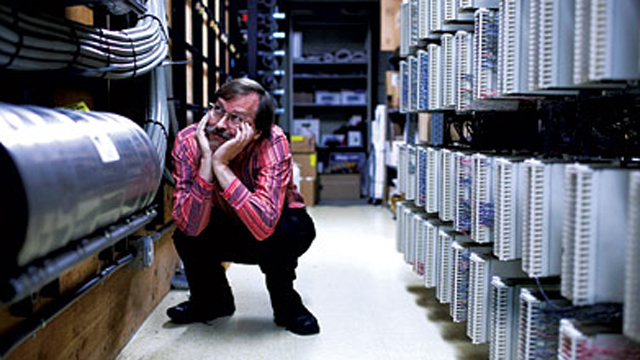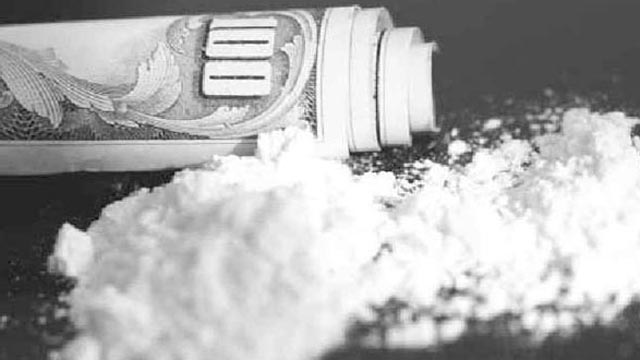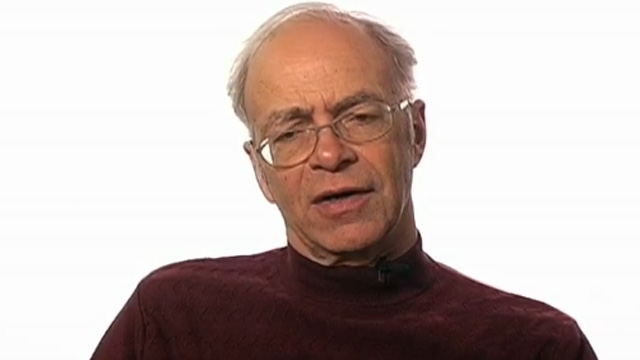Surprising Science
All Stories
Fats, oils and grease are increasingly reprocessed into biofeuls, a method that was put on display when a giant butter sculpture of Benjamin Franklin was melted and made into diesel.
Liberal eugenics and morality-enhancing drugs could combat amoral and anti-social character traits, and could foster the sort of cooperation that will be necessary for tackling global issues that threaten our race.
European scientists have unveiled Nao, a robot that is capable of mimicking human emotions and correctly identifying and responding to negative and positive emotions in other people.
“By allowing artificial intelligence to reshape our concept of personhood, we are leaving ourselves open to the flipside: we think of people more and more as computers.”
“Physicists struggling to reconcile gravity with quantum mechanics have hailed a theory—inspired by pencil lead—that could make it all very simple.” The New Scientist reports.
Larry Wall, the father of Perl programming language, says that the language he created in 1987 is very “post-modern.” Like po-mo architecture, for instance, Perl “collects features from other languages, […]
“Liberals and right-wing libertarians are pressing for an end to prohibition. Forty years after President Nixon launched the ‘war on drugs’ there is a growing momentum to abandon the fight.”
A new meta-analysis shows a large majority of subjects for psychology experiments have been U.S. undergraduates, a population from which one should be wary of making generalized conclusions.
“Telekinesis. Harnessing the mind to control your surroundings. It is the stuff of fantasy. Now, that fantasy is crystallizing into reality.” The L.A. Times on consumer products that read your mind.
“Society has clearly benefited from the invention of caffeine, so why shouldn’t we also put a touch of amphetamine in the water?” The Frontal Cortex ponders human enhancement.
Crops with genetic modifications are cross-pollinating in unintended ways across North Dakota. The pesticide, herbicide and drought resistant strains are proving difficult to control.
Harvard psychologist Gene Heyman says what while people may have predispositions to addiction, evidence shows people consciously choose to break their addictive habits (or not).
MIT scientists have found string theory useful in explaining the behavior of superconductors; applying that theory to other phenomena could move physics in a positive direction.
“We assume that more rational analysis leads to better choices but, in many instances, that assumption is exactly backwards.” Being too analytic confuses our value judgments, say new research.
“Offering a cash prize to encourage innovation is all the rage. Sometimes it works rather well.” The Economist says patrons are offering big prizes like the Ansari X to motivate inventors.
“A car that runs on methane gas produced by human waste has been launched and its makers claim drivers cannot tell the difference.” The Telegraph reports on an alternative to electric vehicles.
Google’s engineers, who necessarily see individuals as conduits of electronic information, are ill-equipped to design privacy regulations—the company should hire anthropologists.
Covering U.S. highways with solar panels would provide enough electricity to power the entire nation, says an Idaho engineer charged by the government to develop self-sustaining roads.
Harvard University economics professor Jeffrey Miron thinks all drugs—including heroin, cocaine, methamphetamine, and LSD—should be made legal and widely available.
Researchers at Harvard and MIT are working to create real-life Transformers: robots that can change their shape depending on the electronic commands they receive.
Scientists have developed a video game that allows players to predict and build protein structures that have stumped computers because of their inadequate spatial reasoning.
By measuring a subject’s brain waves, researchers at Northwestern University can detect the presence of “concealed information”. The technique could be used to uncover terrorist plots.
As the science conference at Google HQ wraps up, the New Scientist reflects on some big ideas—from jet packs to the nature of time and gravity—presented in humble surroundings.
To combat drunkenness, Halifax raised drink prices at bars. Will this also reduce unsafe sex and STI’s?
When children are born with severe, debilitating conditions like some forms of spina bifida—in which some vertebrae on top of the spinal cord remain unfused and open—their lives can often […]
“If there is one true religion in the US, it leads us to worship at the altar of technology.” The Guardian says only a cultural shift will deliver us from future disasters like those of BP and Toyota.
“Does affection for animals confer an evolutionary advantage? Our love of all things furry has deep roots and may have shaped how our ancestors developed language and other tools of civilization.”
“In popular debates about God’s existence, the winners are neither theists nor atheists, but agnostics, who rightly point out that neither side in the debate has made its case.”
The more oppressive the government, the more its citizens will defend it; people support corrupted politicians more fiercely; people with strong family ties are less trusting.
Michael Shermer refutes Deepak Chopra’s modernized conception of God which he bases on ideas originating from quantum mechanics. Chopra demonstrates medieval reasoning, says Shermer.




